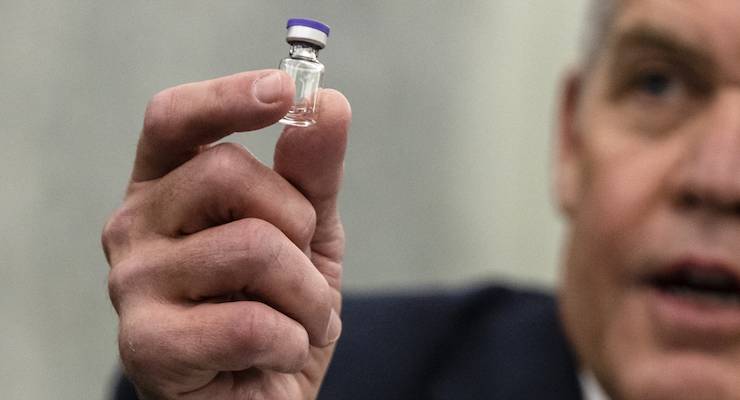
In Both Sides Now, author and ethicist Leslie Cannold presents two sides of an argument. Then it’s over to you: what do you think is true, and what do you think Cannold really believes?
Today: are exclusive vaccine patents morally obscene in a pandemic? Or are they a necessary incentive for pharmaceutical companies to innovate?
Yes
We call them the Moderna, AstraZeneca and Pfizer vaccines. But if the billion-dollar investments in vaccines by governments around the world to reduce mortality from COVID-19 are any indicator, these lifesaving medical interventions aren’t the property of big pharma. They belong to us.
Let’s talk dollars and cents. American taxpayers have shelled out $18 billion on Operation Warp Speed, the US government’s initiative to facilitate and accelerate the development, manufacturing and distribution of COVID vaccines. (While Pfizer likes to say it hasn’t benefited from any of this money, the advance purchase arrangement for $1.95 billion with Operation Warp Speed suggests otherwise.)
Australia has invested $363 million in the global effort to control the novel coronavirus, while the European Union chipped in nearly 611 million euros to the Coalition for Epidemic Preparedness Innovations, a global vaccination initiative that has raised US$760 million through donations from the Gates Foundation, Wellcome Trust and the governments of Japan, Norway, Germany, India, Australia, Belgium, Canada and the UK.
Why does this matter? It matters because vaccine manufacture and distribution are not going to plan. Wealthy countries continue to make side deals with pharmaceutical companies to sew up the majority of doses, while poorer countries won’t get enough. The US still has not granted licences to allow generic manufacturers to produce vaccines, creating artificial shortages.
This is a potential disaster for everyone — not just because uncontrolled spread leaves death and economic devastation in its wake, but also increases the risk of mutations which recent evidence suggests could render the jabs going into arms in the global north less effective against the dominant bug.
As Dr Tedros Adhanom Ghebreyesus, the WHO’s director-general, has wisely noted: “No one is safe until everyone is safe.”
The solution is obvious and needs to happen fast.
We are at war with an invisible and constantly morphing enemy. If we want to win, we can’t wait for vaccine companies to do the right thing. Instead, governments must waive intellectual property rights on new COVID medicines and insist on non-exclusive, royalty-free licences so multiple parties could sell it, lowering the cost.
This is the best way to get proprietary interests out of the way of our collective health at this critical time, ensuring that only the most effective medical technologies are manufactured at scale before being delivered to those who need them most.
No
Passion and high ideals are lovely, but let’s be fair. Pharmaceutical companies aren’t charities. They’re businesses that take the risks of investing in experimental medical interventions that governments won’t, and underfunded universities can’t.
Such high-stake gambles — it can cost as much as US$2 billion to bring a new drug to market — must come with returns, or why would shareholders take them?
As CEO of AstraZeneca Pascal Soriot said: “[Intellectual property or exclusive patents] is a fundamental part of our industry and if you don’t protect [it] then essentially there is no incentive for anybody to innovate.”
Indeed, it is only decades of industry research that have made it possible to produce a coronavirus vaccine at the present speed. And pharmaceutical companies have played more than fair with the public since the COVID crisis began.
Once AstraZeneca gained exclusive rights to the Oxford vaccine, it announced deals to bring more than a billion doses to low- and middle-income countries. It has also stated it would not profit from the jab during the life of the pandemic, a pledge that Johnson & Johnson have echoed.
Even if the industry wasn’t doing the right thing, governments can’t just change the rules of the game when it doesn’t suit. Nationalising private property is a disaster for a system based on trust that market principles will prevail. Once such faith is undermined, the trust of the business community — and the market — will take years to recover.
The pharmaceutical industry and the market have kept faith with the public, delivering a range of safe and effective vaccines in record time. If it ain’t broke, don’t fix it. The market must prevail.
Which side do you think Cannold sits on? And what do you believe? Send your thoughts to letters@crikey.com.au with Both Sides Now in the subject line.








It’s not an either or proposition. You can have agreements where those who put up capital , including governments, get a share of profits. You can also have a government-owned company that rivals private companies.
There’s actually very few innovations that didn’t start with government funding, so this idea that price gouging via IP is necessary for pharmaceutical companies to innovate doesn’t withstand much scrutiny. The technology Pfizer and moderna are using was developed with public funding.
There’s also a rather perverse incentive here, go slow on roll out, guarantee more mutation and more demand for updated vaccines.
First, it is not private property to the extent it is financed by the public.
This at least touches on the more general area of ‘intellectual property’, the fictional world of ownership of ideas This social perversion is based upon our reverence for property, the core of our economic beliefs. It ascribes the same rights of restricting others to property as those vesting in a freeholder owner of land. And that is where it gets ridiculous. If you are first to register, you own that mythical ‘land’. It is capitalism deliberately monopolising innovation to perpetuate its ubiquity.
Really and truly this conversation should not be happening!!!!!
Prior to 1994 we owned the Commonwealth Serum Laboratories (CSL) then it was sold off by the Keating Labor government, along with much of our common wealth.
There would be:-
No issues today in pumping public money into Seqirus (a subsidiary of CSL).
No issues with Intellectual Property- we would own it!
Apparently, as suggested, its not OK to Nationalise private property but its OK to flog off our public property like CSL?
I leave you with this link, with my comment included.
https://theconversation.com/morrison-government-commits-1-billion-over-12-years-for-new-vaccine-manufacturing-supply-150144
Glad that someone has noticed the points I’ve made several times in this past year re CSL.
The class traitors HawKeating et al deserve unending condemnation by what remains of ‘a left‘ (nods to Grundle).
“We are at war with an invisible and constantly morphing enemy.”
We certainly are – the pharmaceutical companies. The vaccine manufacturer Pfizer, although hushed up, has been involved in countless legal cases resulting in millions of dollars of payouts to victims of it’s faulty products. And we trust them to administer us with vaccines? Heaven help us.
I don’t know if nationalising is the answer, but considering big pharma has been benefitting, taken advantage of as well as price gouging (depending on where you live) the public and public money – and considering nowadays more money is spent to marketing and lobbying then R&D, then yes, they need to be reined in, or at least gov’ts needs to build their own capacity. It will then also provide incentive to develop pharmaceuticals for ailments that are considered not profitable for corporate pharmaceutical companies.